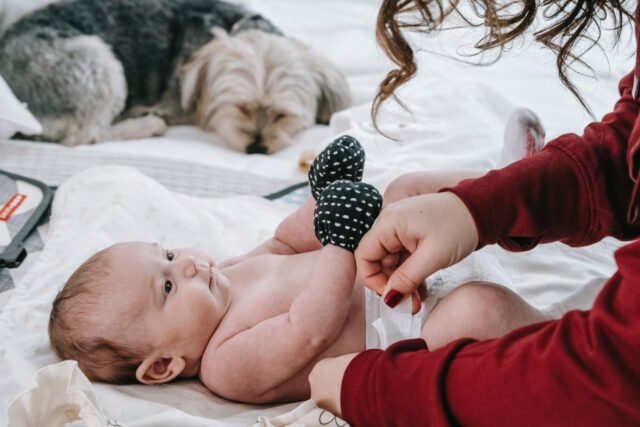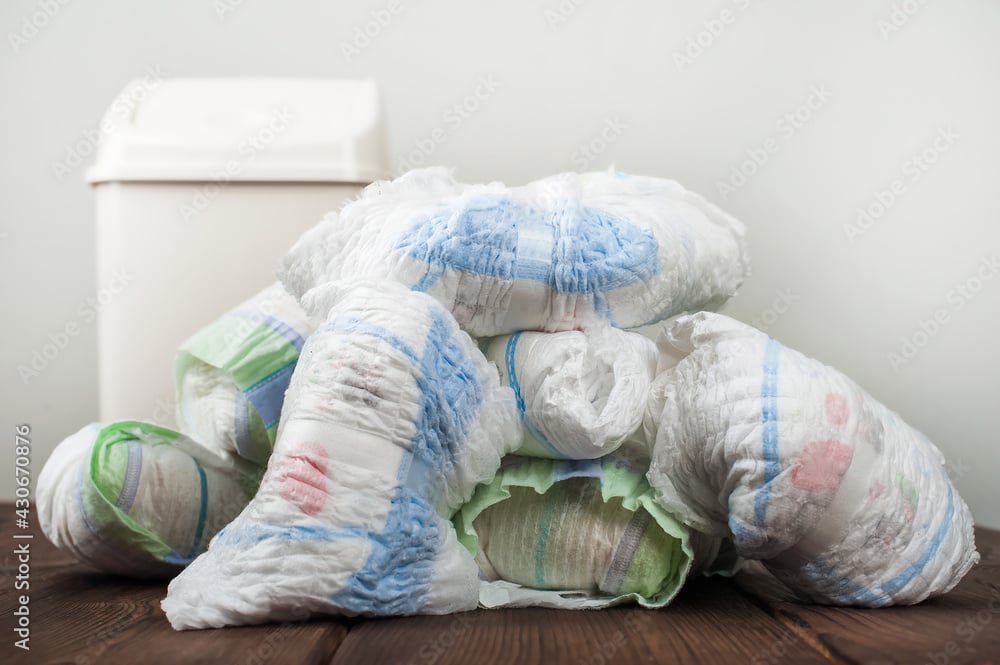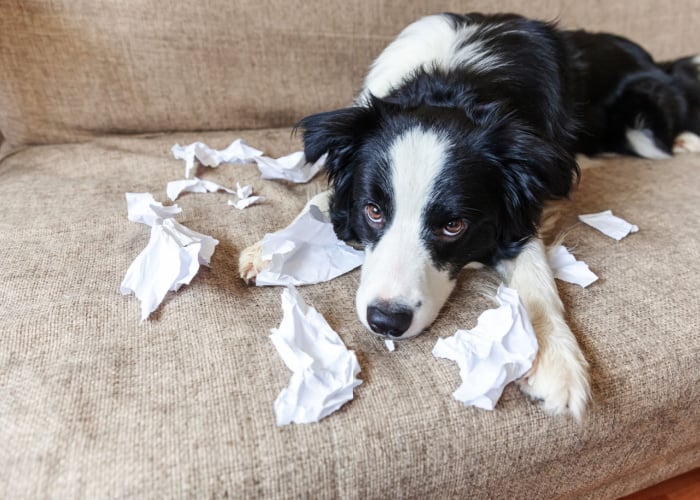
Table of Contents
“My dog ate a diaper! What should I do?”
If you're a new parent and a dog owner, you should know what they say about “messy homes, happy hearts.”
And part of having a “messy home” is accidents—including your dog getting his paws on baby items.
Our dogs don't know better, and eating gross things like diapers is not uncommon. (Oh, you'll be surprised how many dog owners agree on this!)
Now, if you're still in that grey area where you're figuring out what to feel and do after your dog ate a diaper, my advice is don't panic. But act fast.
And you'll learn why in this article.
Below, we're going to cover:
- why are diapers dangerous to dogs when eaten
- symptoms you should look out for
- what to expect from your vet
- why do dogs eat diapers
- how to prevent this from happening again
Let's get to it!
My Dog Ate a Diaper. What Happens Next?
Diapers contain absorbent chemicals that expand when they come into contact with liquid.
Fortunately, according to the Pet Poison Helpline, they likely won't poison your dogs. But, because these chemicals expand, they can absorb acid and other liquids in the dog's stomach when ingested.
This means it can cause blockage in their gastrointestinal tract, which obviously could be a big problem (a.k.a., fatal.)
But apart from these absorbent crystals, disposable diapers also contain many other chemicals that are bad for health, even for humans.
Possible complications that might happen include:
- intestinal blockage (which can be life-threatening in most cases)
- abrasion in the GI tract
- dehydration
- upset stomach or abdominal pain
- hacking sound
- vomiting
- diarrhea
- decreased appetite
- lethargy
- difficulty in passing stool
- increased gas
Now, eating an unused diaper is one thing. Eating a used diaper, poop and all, is another.
Gross, I know.
But you know how some dogs eat their poop? Yep. The naughty ones can also be interested in baby poop.
So what happens, then?
Not only would you have to worry about the absorbent chemicals, but also the bacteria found in baby stool.
This can lead to vomiting, diarrhea, and other diseases that are generally not good for our Fido's health.
RELATED: How To Make A Dog Stop Eating Poop
What about reusable diapers? Surely, our dogs won't take much interest in those, no?
Wrong! Some dogs also eat or try to eat those cloth diapers that eco-friendly Mamas love to use.
If your dog is a heavy chewer, chances are they can rip those reusable diapers, maybe swallow a piece, and block and damage their throat or intestines.
You would also have to consider if your baby uses diaper rash cream. Most of those creams contain zinc, which can be toxic to our furry friends.
Although your dog won't likely ingest much of it as the diaper may only be smeared by the cream, it's still best to tell your vet this.
What Should You Do? Act Fast!
As I mentioned, you don't have to panic if and when your dog eats a diaper.
But what you have to do is act and act fast.
Call your veterinarian immediately as soon as you suspect or witness your dog eating a diaper, used or unused.
If there's a way to do first aid, like inducing vomiting, your vet will guide you through it. But if the diaper pieces have already made their way into your dog's gut, the next thing to do is bring him to the vet.
Don't wait for all the obvious signs before going to the clinic; those won't show until the next 24 to 72 hours. This period is crucial.
Also, do your best to take note of the circumstances around your dog-eating diaper fiasco. Your vet might ask you these questions:
- What type of diaper was eaten? Disposable or reusable?
- Is it used or unused?
- How long ago was it eaten?
- How big is the diaper, and how much of it was eaten?
- Does your dog show any signs of trouble like vomiting or diarrhea (and other signs or complications we have discussed above)?
Make sure to spare no details answering these questions so your vet knows the best thing to do next.
Expect Your Vet To Do These
The vet will take all necessary diagnostic tests to know the proper course of action.
Take a look below to know what to expect at the vet when you bring your dog in for diaper ingestion.
Diagnosis
The first thing your vet will do is an oral exam. This is to check if the blockage is in your dog's throat or if it's still far up and can be removed from that end.
If 24 hours have passed since the incident, the material may be near the dog's rectum. In this case, a rectal exam may be done.
Your vet may do this, especially if you have observed and reported your dog's difficulty passing stool.
The next best thing to do would be imaging tests. X-rays, ultrasound, and endoscopy will help your vet accurately picture where the blockage is already.
These tests may also help your vet see how big of a piece your dog swallowed and, therefore, decide the most appropriate treatment to do.
Blood work may also be done to see if the ingested diaper did anything to affect your dog's overall health.
Treatment Options
Depending on how far along the diaper is lodged in your dog's GI tract, your vet will decide whether to go the non-surgical or surgical route.
Induced vomiting is probably the easiest way to go about it. But that's only if your dog ate the diaper about 4 hours ago or less.
They can do this in several ways. Some vets inject apomorphine, while others administer a 3% hydrogen peroxide solution orally (don't do this at home without your vet's guidance!)
If your dog can vomit the diaper contents, this should be the only treatment he needs.
But if not, your vet may try to expel the diaper in your dog's stomach through the other end.
Along with strict monitoring, your dog may be given laxatives to help the foreign object pass independently. That is if your vet decides it's likely to do so without causing damage to your dog's intestines or if the material is already far down in the GI tract.
At this point, your dog might need IV fluid to keep him from being too dehydrated and an x-ray every few hours to track the progress of the blockage.
Another option your vet can do is endoscopic removal. Here, they will insert a thin camera tube down your dog's throat and use specialized equipment to remove any blockages they see.
However, not all veterinary clinics have this capacity. If they don't but deem this a possible and necessary treatment, the vet might refer you to another facility.
I hope these procedures work because the next and final option you'll have to treat your dog is via surgery.
In intestinal blockage surgery, the vet can remove the foreign object completely and repair any damage it has caused inside your dog's body.
As you would imagine, this is a major procedure requiring anesthesia. This means recovery will also take a while; ideally, it will be for a couple of days in the hospital to prevent any complications.
Why Some Dogs Eat What They Shouldn't
Ah, the age-old question for us dog owners… Why do dogs do what they do?
Or, in this case, why do dogs eat what they shouldn't eat?
We all know that dogs are descended from wolves, a scavenging predator.
Our furry pals, however adorable they may be, still had this inclination to scavenge as part of their survival instinct.
A study in 2001 by Ray and Lorna Coppinger suggested that dogs became domesticated by scavenging human waste some time in the Mesolithic period.
They realized there was food near human villages, and they wouldn't have to scavenge far and wide to fill their hungry tummies.
Our ancestors allowed them because these once wild dogs protected them from other far more dangerous predators.
It became a mutual relationship then, as it is now.
This is still an unproven theory, with some studies debunking this idea without evidence, but it is still widely popular and referenced by other researchers.
Today, our dogs still have the same instinct to scavenge, especially in their puppyhood years. They are curious creatures, after all.
But with proper training, they should be able to outgrow it.
Apart from their scavenging DNA, there are other explanations for dogs eating diapers.
- Boredom. Many dogs do this: chew on something they shouldn't (furniture, shoes… name it) when left alone for long periods. This includes a diaper, especially when they have easy access to it.
- Feeling lonely. The arrival of a new baby may make your dog feel like he's forgotten and left out. And if eating diapers will get your attention, then so be it!
- Stressed or Anxious. Some dogs, when over-stimulated, turn to scavenging to calm themselves. Your dog may get triggered by something that makes him stressed or anxious.
- They're hungry or searching for a new taste. There's a reason why stray dogs always go for the garbage—they're most likely hungry and are looking for something to eat. However, if you know that your dog is well-fed yet still does this, he may be looking for something new to his palate.
- Medical condition. Gastroenteritis, indigestion, Irritable Bowel Disease, and parasites can make our dogs uncomfortable. They might think eating diapers or something unfamiliar could ease their discomfort.
- Pica. This is another medical condition where animals (not just dogs, but even goats or humans!) have a strong urge to eat non-edible items like rocks, grass, toys, and diapers.
Make sure it doesn't happen again!
Dogs are naturally curious creatures. They will do things that'll leave us scratching our heads.
That being said, how would you prevent your dog from eating diapers again?
The most obvious solution is to keep the diapers away and put them where your dog won't reach them.
But being a dog parent myself, I know how smart and resourceful dogs can be, so here are other solutions that might help.
- Spend more quality time with your dog. Include him in activities with your baby, like bringing him along for your baby's daily walk in the stroller.
- Give him toys and activities that will stimulate him physically and mentally. Train him to play with these toys, especially when you must leave him alone for a few hours.
- Social and behavioral training will also help your dog behave more appropriately. It is important to prevent them from eating more baby products because you want to train them to play and be safe around a tiny human being.
- If your dog has access even to your outside trash, spray it with a dog-deterrent spray so he would know better than to come near it.
- Switch up their usual meal for something new and exciting. You can also try enrichment feeding by using interactive feeders or employing other methods to keep mealtimes fun for them.
- Check with your veterinarian, especially if it's a medical condition causing this behavior.
FAQs about Dogs and Diapers
Why do dogs love diapers?
Dogs have a powerful sense of smell and find diapers interesting because of their ‘aroma' and texture.
Used diapers, in particular, have a stronger smell (obviously). But they don't find it as disgusting as we do.
One Quora answer said that ammonia in used diapers attracts dogs to them, as well as fecal bacteria that some dogs find appealing.
RELATED: 25 Dogs With the Best Sense of Smell
Will eating a diaper kill a dog?
No, your dog won't die just because he ate a piece of the diaper.
The diaper is non-toxic; the only thing you have to be wary of is the diaper obstructing your dog's GI tract.
Vomiting, defecating, or surgery can help rectify this. See our Treatment Options section above.
What should I do if my dog ate diaper cream?
Many diaper rash creams contain zinc oxide, a highly poisonous substance for dogs.
Regardless of whether your dog only licked a smear of it on the diaper or chewed on a whole tube of cream, contact your vet immediately or the Pet Poison Helpline at (855) 764-7661 for immediate help.
Dog Ate a Diaper: Before You Go…
The best thing to always remember when your dog eats something he shouldn't have is not to panic. Panicking clouds our judgment and affects our decision-making.
My advice is to visit your vet immediately instead of waiting around to see if your dog will have a negative reaction from eating a diaper.
And, of course, ensure the incident won't happen again by doing the preventative steps discussed above.
Did something similar happen to your dog in the past? Share your experience in the comments section!
You can also check out our other recommended articles below.














